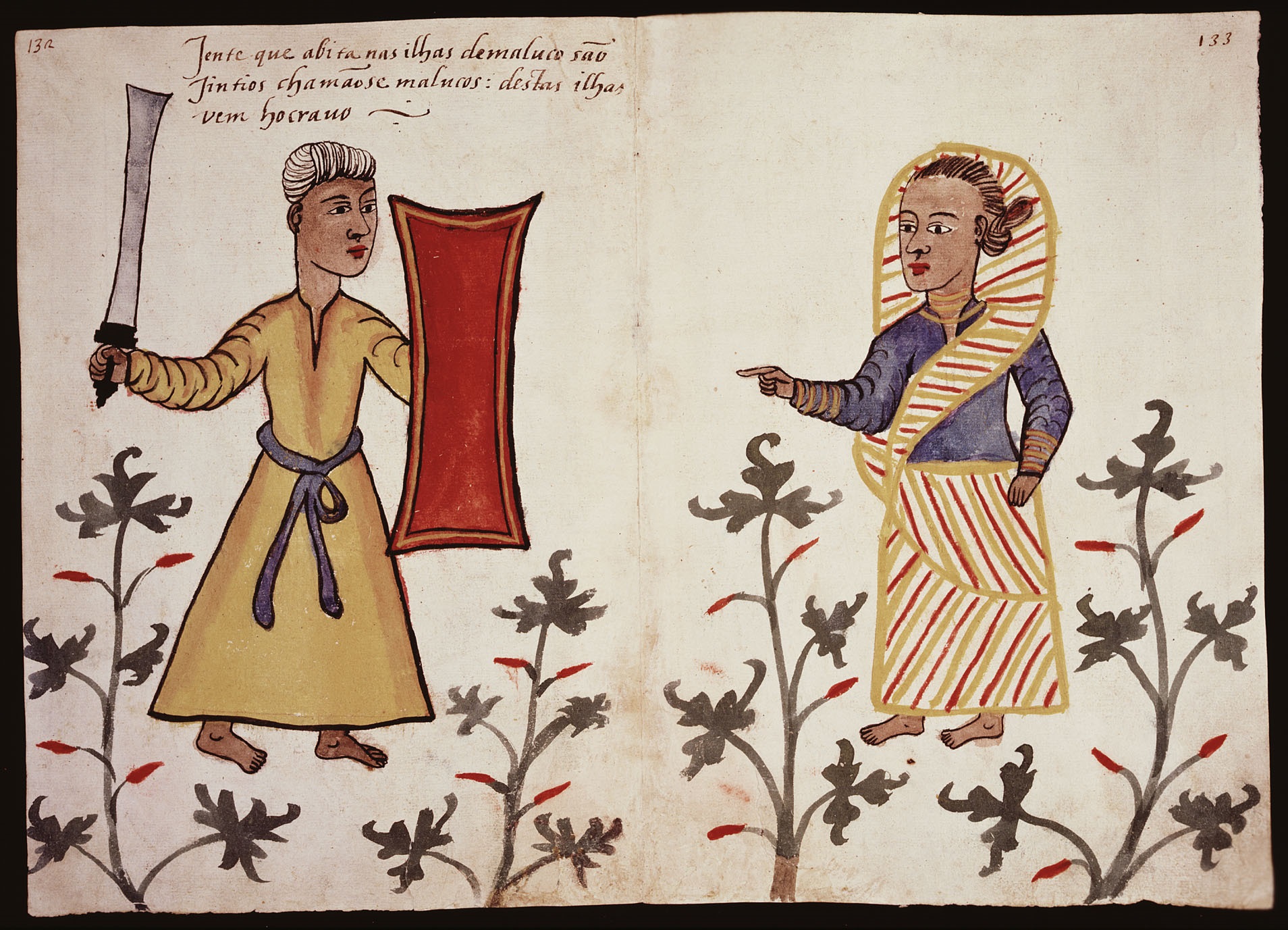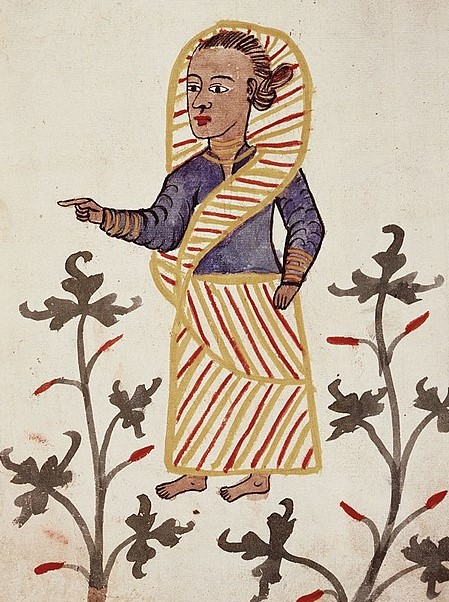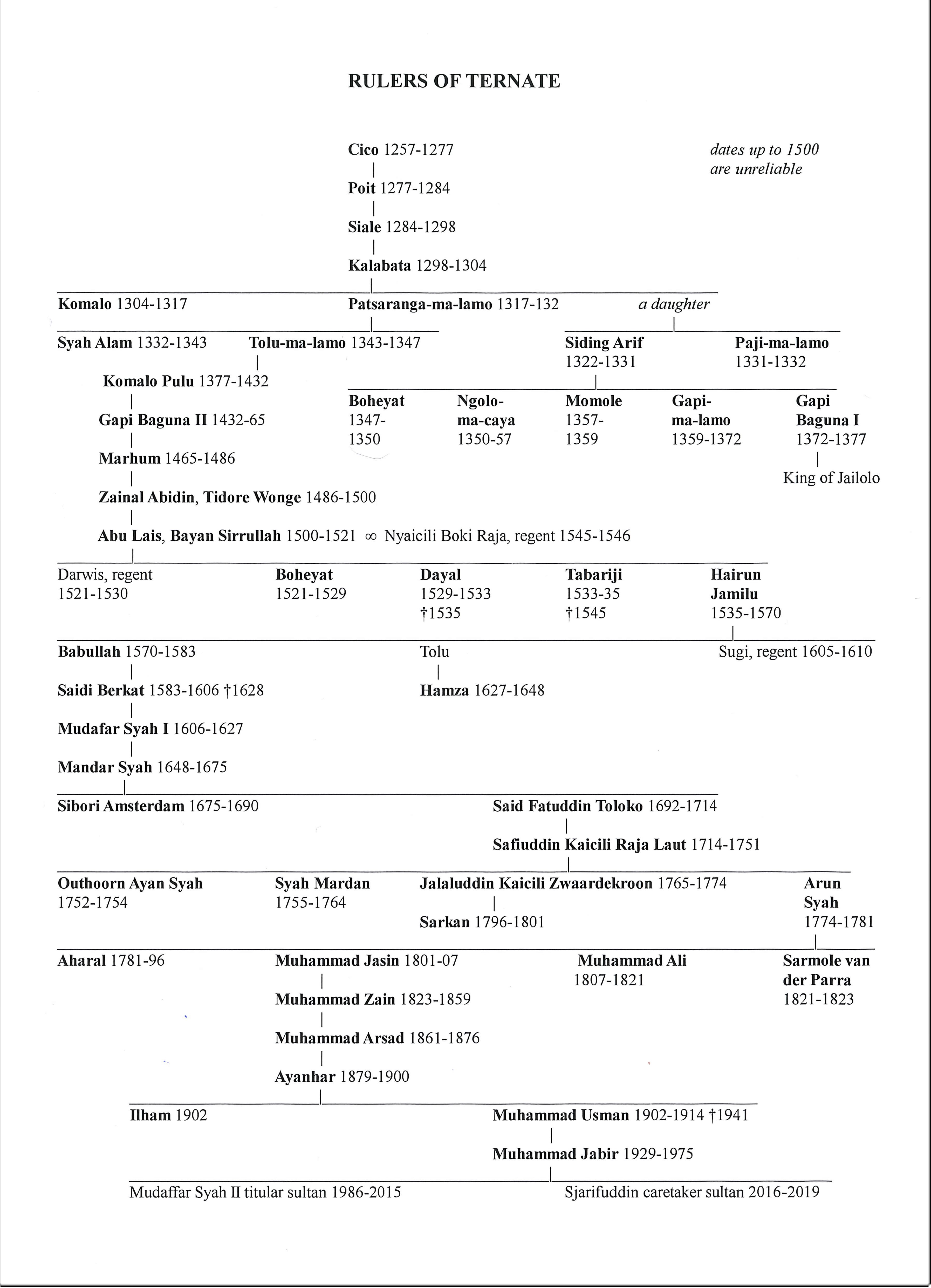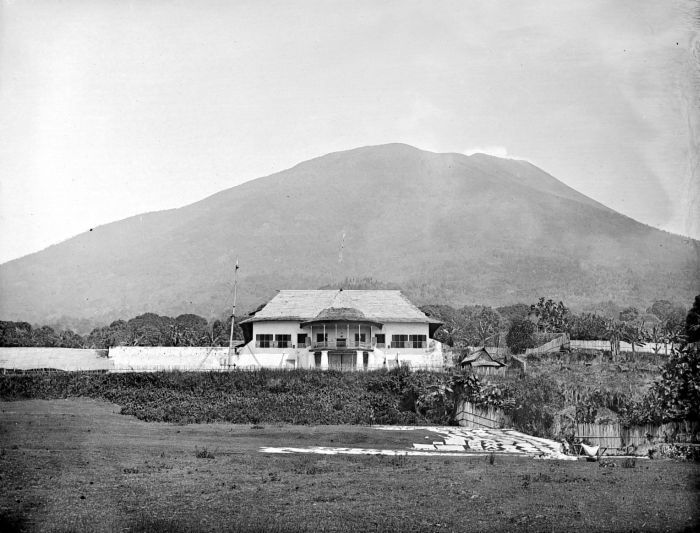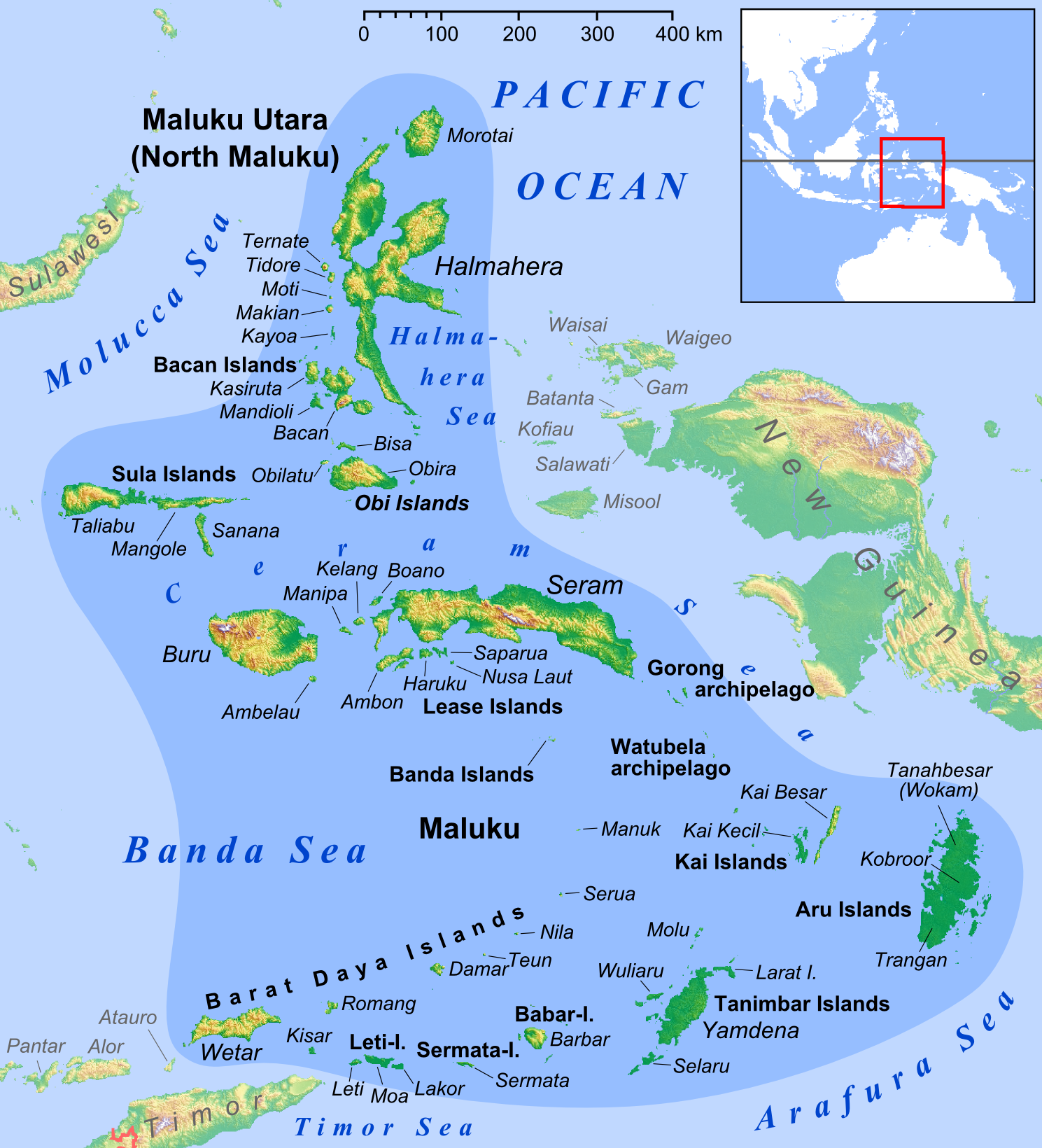|
Hairun
Sultan Hairun Jamilu (c. 1522 – 28 February 1570) was the 6th Muslim ruler of Ternate in Maluku, reigning from 1535 to 1570. During his long reign, he had a shifting relation to the Portuguese who had a stronghold in Ternate and tried to dominate the spice trade in the region. This ended with his assassination at the hands of a Portuguese soldier in 1570. Early life Portuguese seafarers from Melaka had appeared in the waters of eastern Indonesia since 1512. The trade in spices and forest products made it vital for the early colonizers to secure bases in the Maluku Islands (Moluccas) and control the enormously lucrative commerce. A fort was built on Ternate in 1522–1523 with the approval of the local Sultan, who hoped for military assistance to expand his own power. At the time Ternate was the most powerful of the four sultanates of North Maluku, the other being Tidore, Bacan and Jailolo. However, the Portuguese captains soon began to dominate the royal court while the garrison ... [...More Info...] [...Related Items...] OR: [Wikipedia] [Google] [Baidu] |
Babullah Of Ternate
Sultan Babullah (10 February 1528 (?) – July 1583), also known as Sultan Baabullah (or Babu aabin European sources) was the 7th Sultan and 24th ruler of the Sultanate of Ternate in Maluku who ruled between 1570 and 1583. He is known as the greatest Sultan in Ternatan and Moluccan history, who defeated the Portuguese occupants in Ternate and led the Sultanate to a golden peak at the end of the 16th century. Sultan Babullah was commonly known as the ''Ruler of 72 (Inhabited) Islands'' in eastern Indonesia, including most of the Maluku Islands, Sangihe and parts of Sulawesi, with influences as far as Solor, East Sumbawa, Mindanao, and the Papuan Islands. His reign inaugurated a period of free trade in the spices and forest products that gave Maluku a significant role in Asian commerce. Youth He is traditionally said to have been born on February 10, 1528, though it might have been much later since his father Hairun is stated by Portuguese sources to have been born in c. 1522. ... [...More Info...] [...Related Items...] OR: [Wikipedia] [Google] [Baidu] |
Nyaicili Boki Raja
Nyaicili Boki Raja (died after 1556) was a Queen of Ternate in Maluku Islands who served as regent of the kingdom in 1545-1546. She was later baptized by the Catholic missionary Francis Xavier and took the name Dona Isabel. Being the daughter, wife, sister and mother of kings, she had a potentially bridge-building function between the competing Malukan spice Sultanates Ternate and Tidore, but was repeatedly sidelined by the brutal policy of early European colonialism in Maluku. Dynastic position Her original name is not known, since Nyaicili Boki Raja (Naychile Puka Raga) is a title meaning "Junior Lady Royal Princess". She was a daughter of Sultan al-Mansur of Tidore (d. 1526) and married Sultan Bayan Sirrullah of Ternate some time prior to 1518. Ideas about her position in the Ternate dynasty differ among historians. Paramita R. Abdurrachman believes that she was the mother of three sons who became Sultans of Ternate in turn: Boheyat (r. 1521-1529), Dayal (r. 1529-1533) and ... [...More Info...] [...Related Items...] OR: [Wikipedia] [Google] [Baidu] |
Tabariji Of Ternate
Tabariji or Tabarija (c. 1518–1545) was the Sultan of Ternate in Maluku, whose realm also included Makian and other east Indonesian islands. He reigned from 1533 to 1535, when he was deposed by the dominant Portuguese and exiled to India. He later became a convert to Catholicism under the name Dom Manuel. Reign Tabariji was the son of Sultan Bayan Sirrullah (also known as Abu Lais) and his first and primary wife, Nyaicili Boki Raja. Nyaicili was the daughter of the King of Tidore; her brother Mir ruled that kingdom after the death of their father in 1526, which gave her increased political leverage. The Portuguese had previously arrived from Melaka in order to secure the spice trade and built a fort on Ternate in 1522-1523. They soon came to dominate the Ternatan court and manipulated the succession. All this led to great resentment among the Ternatan elite. The Portuguese captain Vincente de Fonseca and the Ternatan regent Pati Sarangi planned to assassinate the boy king ... [...More Info...] [...Related Items...] OR: [Wikipedia] [Google] [Baidu] |
North Maluku
North Maluku ( id, Maluku Utara) is a province of Indonesia. It covers the northern part of the Maluku Islands, bordering the Pacific Ocean to the north, the Halmahera Sea to the east, the Molucca Sea to the west, and the Seram Sea to the south. The provincial capital is Sofifi on the largest island of Halmahera, while the largest city is the island city of Ternate. The population of North Maluku was 1,038,087 in the 2010 census,Central Bureau of Statistics: ''Census 2010'' , retrieved 17 January 2011 making it one of the least-populous provinces in Indonesia, but by the 2020 Census the population had risen to 1,282,937, and the official estimate as at mid 2021 was 1,299,177. North Maluku was originally the centre of the four largest Islamic sultanates in the eastern Indonesian archi ... [...More Info...] [...Related Items...] OR: [Wikipedia] [Google] [Baidu] |
Sultan Of Ternate
This is a list of rulers of Maluku from proto-historical times until the present. The four sultanates of Ternate, Tidore, Sultanate of Jailolo, Jailolo and Bacan Islands, Bacan were considered descendants of a legendary figure called Jafar Sadik and formed a ritual quadripartition. Drawing wealth from the spice production and trade with other parts of Asia, Ternate and Tidore lorded over extensive realms which stretched from Sulawesi to West Papua (region), Papua, while Jailolo and Bacan merely had local significance. They fell under Portugal, Portuguese or Spain, Spanish influence in the sixteenth century, superseded by Netherlands, Dutch impact in the seventeenth century. The sultanates were subordinated to the Dutch colonial state until 1942 when the Japanese occupied Indonesia. After the outbreak of the Indonesian revolution they belonged to the Dutch-approved quasi-state East Indonesia from 1946 to 1950 when they were incorporated in the unitary Indonesian state. Sultans of Ba ... [...More Info...] [...Related Items...] OR: [Wikipedia] [Google] [Baidu] |
Mir Of Tidore
Sultan Mir, or Amiruddin Iskandar Dulkarna'in (c. 1511 ― 1550s) was the third Sultan of Tidore in Maluku Islands. He had a long and troubled reign from 1526 to the 1550s where he tried to counter the hegemonic ambitions of the Portuguese and their Ternate allies. The global rivalries between Spain and Portugal characterized the period, and the two Iberian powers indiscriminately involved the spice sultanates Tidore and Ternate in their power game. Succession to the throne In the 16th century Tidore was the second most important polity in North Maluku after Ternate. The Malukan sultanates generated some wealth through the trade in cloves which attracted merchants from other parts of Asia, and eventually European seafarers. The best cloves supposedly grew in Tidore. The Portuguese, coming from Melaka, established a base in nearby Ternate and, allying with the local elite, made war on Tidore. After a temporary peace agreement in 1526, Sultan al-Mansur was apparently poisoned by a P ... [...More Info...] [...Related Items...] OR: [Wikipedia] [Google] [Baidu] |
Sultanate Of Ternate
The Sultanate of Ternate (Jawi alphabet: كسلطانن ترنتاي), previously also known as the Kingdom of Gapi is one of the oldest Muslim kingdoms in Indonesia besides Tidore, Jailolo, and Bacan. The Ternate kingdom was established by Momole Cico, the first leader of Ternate, with the title Baab Mashur Malamo, traditionally in 1257. It reached its Golden Age during the reign of Sultan Baabullah (1570–1583) and encompassed most of the eastern part of Indonesia and a part of southern Philippines. Ternate was a major producer of cloves and a regional power from the 15th to 17th centuries. The dynasty founded by Baab Mashur Malamo continues to the present, as does the Sultanate itself, although it no longer holds any political power. History Pre-colonial period The sultanate was originally named the Kingdom of Gapi, but later changed the name to be based on that of its capital, Ternate. Originally there were four villages in Ternate and led by clan leaders called Mom ... [...More Info...] [...Related Items...] OR: [Wikipedia] [Google] [Baidu] |
Bayan Sirrullah
Bayan Sirrullah (d. 1521) was the second Sultan of Sultanate of Ternate, Ternate in Maluku Islands, Maluku. He is also known as Abu Lais (in Portuguese sources, Boleife) or Kaicili Leliatu. He ruled from perhaps 1500 to 1521, and is important as the first east Indonesian ruler who made contact with the encroaching Portuguese people, Portuguese. Historical position Bayan Sirrullah was the eldest son of the first Sultan of Ternate, Zainal Abidin of Ternate, Zainal Abidin, and a woman from ''soa'' Marsaoli. According to a later account, his reign started in the year 1500. Islam had been accepted by the local elites of North Maluku in the second half of the 15th century, as a consequence of the importance of Muslim traders in the archipelago. Ternate was an important center for the trade in cloves, and was transformed from a traditional domain under a ''Kolano'' (king) into a sultanate with selective Islamic features. Bayan Sirrullah is, in fact, the first ruler who is known from c ... [...More Info...] [...Related Items...] OR: [Wikipedia] [Google] [Baidu] |
Fort Kastela
Fort Kastela ( id, Benteng Kastela) is a ruined Portuguese fortress located at the southwest coast of Ternate. It is famous for being the first colonial fortification constructed in the Spice Islands (Maluku) of Indonesia. Built by the Portuguese in 1522, it is also referred to in different languages as São João Baptista de Ternate or Fortaleza de Ternate (Portuguese), Ciudad del Rosario (Spanish) or Gammalamma (Ternatean and Dutch). Today it is locally known as Kastella/Kastela. History In April 1521, a fleet was dispatched by King Manuel I of Portugal from Lisbon under the command of Jorge de Brito. The fleet was given orders to intercept the Spanish fleet of Ferdinand Magellan while sailing towards the Spice Islands from the Americas. Upon making landfall, they were ordered to construct a fortress on Ternate and to establish the Portuguese pre-eminence in the region. The initial fort was named by the Portuguese after Saint John the Baptist, on whose feast day the first stone ... [...More Info...] [...Related Items...] OR: [Wikipedia] [Google] [Baidu] |
Bacan Islands
The Bacan Islands, formerly also known as the Bachans, Bachians, and Batchians, are a group of islands in the Moluccas in Indonesia. They are mountainous and forested, lying south of Ternate and southwest of Halmahera. The islands are administered by the South Halmahera Regency of North Maluku Province. They formerly constituted the Sultanate of Bacan. Bacan ( nl, Batjan), formerly also known as Bachian or Batchian, is the group's largest island. The second and third-largest islands are Kasiruta and Mandioli. Bacan Island in 2020 included about 82,387 people, of which about 10,000 live in the capital Labuha; it is subdivided into seven districts. Kasiruta and Mandioli each have over 10,000 inhabitants, and each is subdivided into two districts. A fourth island, Bacan Lomang, forms a twelfth district within the group. There are dozens of smaller islands in the group, which had a total population of 84,075 at the 2010 Census, but by the 2020 Census had risen to 111,517. The offic ... [...More Info...] [...Related Items...] OR: [Wikipedia] [Google] [Baidu] |
Menado
Manado () is the capital city of the Indonesian province of North Sulawesi. It is the second largest city in Sulawesi after Makassar, with the 2020 Census giving a population of 451,916 distributed over a land area of 162.53 km2.Badan Pusat Statistik, Jakarta, 2021. The Manado metropolitan area has a population of 1.2 million as of 2018. The city is located adjacent to the Bay of Manado, and is surrounded by a mountainous area. Manado is among Indonesia's top-five tourism priorities. The city is served by Sam Ratulangi International Airport, which has direct international flights to the Philippines, Singapore, and China, as well as many domestic destinations. Bunaken National Park is one of the city's most famous tourist attractions. The city is also known for its Christian-majority population, and holds the country's biggest Christmas celebration annually. It is also recognised as one of the most tolerant and peaceful cities in Indonesia. Etymology The name Manado is der ... [...More Info...] [...Related Items...] OR: [Wikipedia] [Google] [Baidu] |
Francis Xavier
Francis Xavier (born Francisco de Jasso y Azpilicueta; Latin: ''Franciscus Xaverius''; Basque: ''Frantzisko Xabierkoa''; French: ''François Xavier''; Spanish: ''Francisco Javier''; Portuguese: ''Francisco Xavier''; 7 April 15063 December 1552), venerated as Saint Francis Xavier, was a Spanish Catholic missionary and saint who was a co-founder of the Society of Jesus. Born in Javier (Xavier in Old Spanish and in Navarro-Aragonese, or Xabier, a Basque word meaning "new house"), in the Kingdom of Navarre (in present-day Spain), he was a companion of Ignatius of Loyola and one of the first seven Jesuits who took vows of poverty and chastity at Montmartre, Paris in 1534. He led an extensive mission into Asia, mainly the Portuguese Empire in the East, and was influential in evangelisation work, most notably in early modern India. He was extensively involved in the missionary activity in Portuguese India. In 1546, Francis Xavier proposed the establishment of the Goan Inquisition ... [...More Info...] [...Related Items...] OR: [Wikipedia] [Google] [Baidu] |
